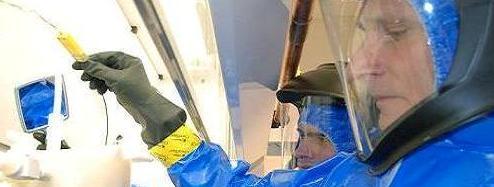
An important new laboratory has opened that adds to the technical infrastructure supported by the Superconducting Radio Frequency (SRF) Group at TRIUMF. The Chemical Etching Laboratory is used to 'superclean’ ultra-pure Niobium, both prior to welding during the cavity fabrication process and after the cavity is complete.
Niobium is a metal that becomes superconducting at temperatures below 9.2K and is the material of choice for modern superconducting cavities. These cavities are technically challenging to produce but when done correctly can provide large accelerating fields using relatively little electrical power. Superconducting RF performance is strongly dependent on the purity of the niobium. To maintain purity the niobium is welded with an electron beam in a vacuum. However, during manufacture the niobium surface can be contaminated with other materials by machining or forming steps. Welding of the completed parts can then melt the foreign inclusions into the pure niobium leading to significantly reduced performance. Similarly, before being super-cooled, the surface of the finished cavity has to be returned to the original pure state.
In the new lab, a potent and precise mix of strong acids is safely employed to remove a thin layer of niobium and any foreign material from the niobium surface. Each part that needs to be welded is placed in the acid bath for 15-20 minutes. Some sub-assemblies may require several ‘etching’ steps depending on the number of welds required. In addition, the completed cavity is further etched for about two hours to further clean and polish the niobium surface. The new lab allows for the safe handling of the acid and maintains the acid at a cool temperature that is required for optimum results.
The new infrastructure greatly expands the technical capability of the SRF group. The group is now able to support local company PAVAC Industries in the manufacture of cavities for TRIUMF accelerators as well as to take part in the global research and development of this exciting and rapidly advancing field.
The combined efforts of Robert Laxdal, TRIUMF’s group leader for SRF, Peter Harmer, TRIUMF’s Senior Technician, and Oliver St. Quintin, Consultant from Egistra Innovation made the addition of this new infrastructure a success.
Story contributed by Robert Laxdal
Maria Jose Crousillat
TRIUMF's Communications Assistant
